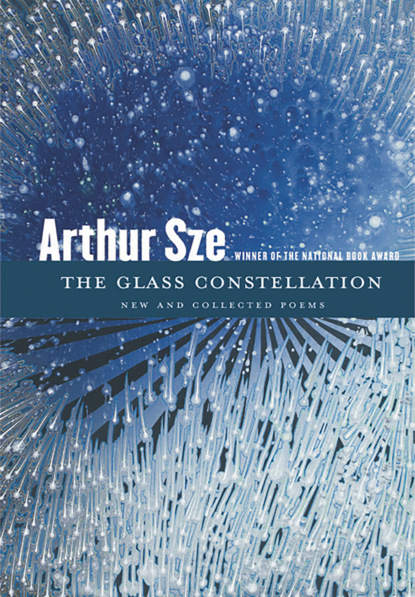a Zen meal—
setting a yarrow stalk aside to represent the infinite—
9
They threw Pushing Upward—
the pearl on a gold thread dangling at her throat—
a rice bowl with a splashed white slip—
biting the back of her neck—
as a galaxy acts as a gravitational lens and bends light—
stirring matcha to a froth with a bamboo whisk—
brushing her hair across his body—
noticing a crack
has been repaired with gold lacquer—
Comet Hyakutake’s tail flaring upward in the April sky—
orange and pink entwined bougainvilleas blooming in a pot—
“Oh god, oh my god,” she whispered and began to glow—
yellow tulips opening into daylight—
staring at a black dot on the brown iris of her right eye—
water flows to what is wet.
Apache Plume
1 The Beginning Web
Blue flax blossoming near the greenhouse
is a luminous spot, as is a point south
of the Barrancas where two rivers join.
By the cattail pond, you hear dogs
killing a raccoon. In mind, these spots
breathe and glow. In the bath I pour
water over your shoulder, notice the spot
where a wild leaf has grazed your skin.
I see the sun drop below the San Andres
Mountains, white dunes in starlight;
in the breathing chiaroscuro, I glimpse
red-winged blackbirds nesting in the cattails,
see a cow pushing at the wobbly point
in a fence. In this beginning web of light,
I feel the loops and whorls of your fingertips,
hear free-tailed bats swirling out into the dark.
2 Reductions and Enlargements
A Chippewa designer dies from pancreatic cancer
and leaves behind tracing paper, X-Acto knives,
rubber cement, non-photo blue pencils,
a circular instrument that calculates reductions
and enlargements. A child enters a house and finds
a dead man whose face has been eaten by dogs.
Who is measuring the pull of the moon in a teacup?
In a thousand years, a man may find barrels
of radioactive waste in a salt bed and be unable
to read the warnings. Sand is accumulating
at the bottom of an hourglass, and anything—
scissors, green wind chime, pencil shavings,
eraser smudge, blooming orchid under skylight—
may be a radial point into light. When a carp
flaps its tail and sends ripples across the surface
of a pond, my mind steadies into a glow. Look
at a line that goes into water, watch the wake,
see the string pulse and stretch into curved light.
3 The Names of a Bird
You find a downy woodpecker on the bedroom floor.
I am startled and listen in the snowy dark
to deer approach a house and strip yew leaves.
In pots, agapanthuses are opening umbels
of violet flowers. Neither driven by hunger
nor flowering in the moment, what drives an oologist
to distinguish finch eggs from wren or sparrow?
What drives a physicist to insist the word
sokol means falcon in Hungarian? If you know
the names of a bird in ten languages, do you know
any more about the bird? Driving past an ostrich farm,
I recollect how you folded a desert willow blossom
into a notebook; I recollect rolling down
a white dune at dusk, pulling a green jade disk
on a thread at your throat into my mouth.
I know what it is to touch the mole between your breasts.
4 The Architecture of Silence
The gate was unlocked. We drove to the road’s end; grapefruit lay on the ground not far from a white house whose window caught a glare. December 29, four p.m. At first we couldn’t find the trail but walked ahead and crossed a river full of black boulders. Days earlier, we had looked down into the valley from a kukui grove. There was speckled bark, slanting rain, horses in a field, drenching rain. We had been walking back from the ocean where we moved from rock to rock and saw black crabs scuttling along the tide line. We looked into the water, saw sea cucumbers on rocks. On the way back, white lepiotas among grass and a small white puffball. I sliced open the puffball, but it was olive-green. Deer, crossing the road, stopped near the fence line and gazed back at us. I inhaled the aroma of shredded ginger and saw three pairs of dragonflies overhead, their wings catching daylight. Where is the one inside the many? Or are there many inside one? We came to a fork in the trail and noticed an exposed root growing across the right branch. We twisted left and glimpsed twin waterfalls; wild boar were stunned in our headlights. In the twilight, we came to another stream with white water rushing across black boulders and paused:
raindrops
dropping off the eaves
stop dropping
5 Hourglass
Père Lachaise: breaking bread on a green bench
under chestnut trees as rain drizzles down the leaves
and smoke rises out of the crematorium chimney—
is recollection a form of memento mori?
I see papyrus growing in a copper tub in the bedroom;
your hands rub blackthorn oil into my skin.
I close my eyes, feel the warmth of straw-flecked adobe walls—
a white chrysanthemum opens in a cup of boiling water.
Willow leaves on the skylight cast onto an ochre wall
shadows resembling herring under a float house.
Is recollection a form of epistemological inquiry?
I am
